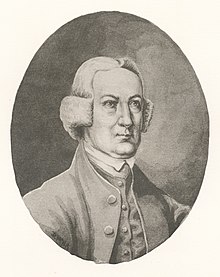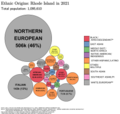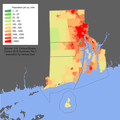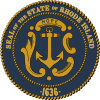Portal:Rhode Island
The Rhode Island Portal Rhode Island (/ˌroʊd-/ , pronounced "road") is a state in the New England region of the Northeastern United States. It borders Connecticut to its west; Massachusetts to its north and east; and the Atlantic Ocean to its south via Rhode Island Sound and Block Island Sound; and shares a small maritime border with New York, east of Long Island. Rhode Island is the smallest U.S. state by area and the seventh-least populous, with slightly fewer than 1.1 million residents as of 2020; but it has grown at every decennial count since 1790 and is the second-most densely populated state, after New Jersey. The state takes its name from the eponymous island, though nearly all its land area is on the mainland. Providence is its capital and most populous city. Native Americans lived around Narragansett Bay for thousands of years before English settlers began arriving in the early 17th century. Rhode Island was unique among the Thirteen British Colonies in having been founded by a refugee, Roger Williams, who fled religious persecution in the Massachusetts Bay Colony to establish a haven for religious liberty. He founded Providence in 1636 on land purchased from local tribes, creating the first settlement in North America with an explicitly secular government. The Colony of Rhode Island and Providence Plantations subsequently became a destination for religious and political dissenters and social outcasts, earning it the moniker "Rogue's Island". Rhode Island was the first colony to call for a Continental Congress, in 1774, and the first to renounce its allegiance to the British Crown, on May 4, 1776. After the American Revolution, during which it was heavily occupied and contested, Rhode Island became the fourth state to ratify the Articles of Confederation, on February 9, 1778. Because its citizens favored a weaker central government, it boycotted the 1787 convention that had drafted the United States Constitution, which it initially refused to ratify; it finally ratified it on May 29, 1790, the last of the original 13 states to do so. The state was officially named the State of Rhode Island and Providence Plantations since the colonial era but came to be commonly known as "Rhode Island". In November 2020, the state's voters approved an amendment to the state constitution formally dropping "and Providence Plantations" from its full name. Its official nickname is the "Ocean State", a reference to its 400 mi (640 km) of coastline and the large bays and inlets that make up about 14% of its area. (Full article...) Entries here consist of Good and Featured articles, which meet a core set of high editorial standards.
Cormac McCarthy (born Charles Joseph McCarthy Jr.; July 20, 1933 – June 13, 2023) was an American writer who authored twelve novels, two plays, five screenplays, and three short stories, spanning the Western and postapocalyptic genres. His works often include graphic depictions of violence, and his writing style is characterised by a sparse use of punctuation and attribution. He is widely regarded as one of the greatest American novelists. McCarthy was born in Providence, Rhode Island, although he was raised primarily in Tennessee. In 1951, he enrolled in the University of Tennessee, but dropped out to join the U.S. Air Force. His debut novel, The Orchard Keeper, was published in 1965. Awarded literary grants, McCarthy was able to travel to southern Europe, where he wrote his second novel, Outer Dark (1968). Suttree (1979), like his other early novels, received generally positive reviews, but was not a commercial success. A MacArthur Fellowship enabled him to travel to the American Southwest, where he researched and wrote his fifth novel, Blood Meridian (1985). Although it initially garnered a lukewarm critical and commercial reception, it has since been regarded as his magnum opus, with some labeling it the Great American Novel. (Full article...)Selected article -Samuel Ward (May 25, 1725 – March 26, 1776) was an American farmer, politician, Rhode Island Supreme Court justice, governor of the Colony of Rhode Island and Providence Plantations, and delegate to the Continental Congress where he signed the Continental Association. He was the son of Rhode Island Governor Richard Ward, was well-educated, and grew up in a large family in Newport, Rhode Island. He and his wife received property in Westerly, Rhode Island from his father-in-law, and the couple settled there and took up farming. He entered politics as a young man and soon took sides in the hard money vs. paper money controversy, favoring hard money or specie. His primary rival over the money issue was Providence politician Stephen Hopkins, and the two men became bitter rivals; the two also alternated as governors of the colony for several terms. During this time of political activity, Ward became a founder and trustee of Brown University. The most contentious issue that he faced during his three years as governor involved the Stamp Act, which had been passed by the British Parliament just before he took office for the second time. The Stamp Act placed a tax on all official documents and newspapers, infuriating the American colonists by being done without their consent. Representatives of the colonies met to discuss the act, but when it came time for the governors to take a position, Ward was the only one who stood firm against it, threatening his position but bringing him recognition as a great Patriot. (Full article...)Did you know?
Quotes related to Rhode IslandRelated portalsSelected picture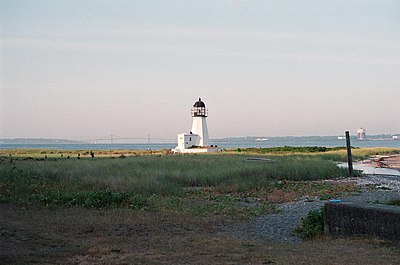 The Prudence Island Lighthouse (known locally as the Sandy Point Lighthouse) is located on Sandy Point, Prudence Island, Rhode Island and is the oldest lighthouse tower in the state. Sandy Point is nicknamed Chibacoweda, meaning "little place separated by a passage," because the location is a little more than one mile offshore. General imagesThe following are images from various Rhode Island-related articles on Wikipedia.
TopicsSelected panoramaThe Claiborne Pell Newport Bridge with lightning
Quality content
Featured articlesFeatured listsGood articles
Featured portalsFeatured article candidatesGood article nomineesFormer featured articlesFormer featured listsFormer good articlesSubcategoriesRelated WikiProjectsThings you can do
Associated WikimediaThe following Wikimedia Foundation sister projects provide more on this subject:
Discover Wikipedia using portals |


